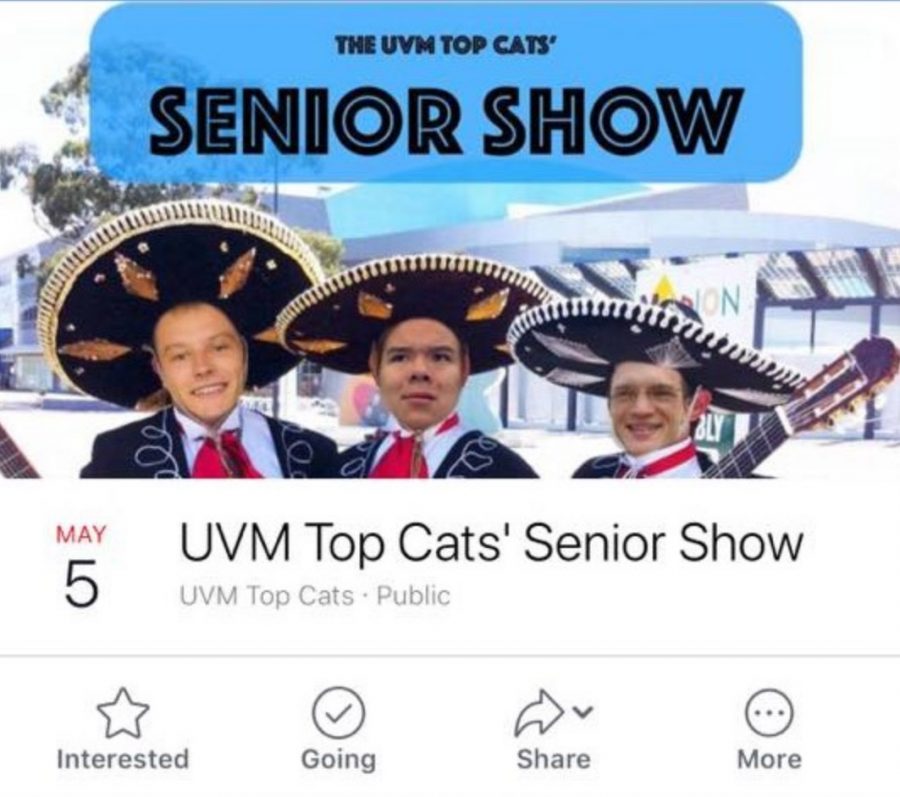Top Cats sanctioned by SGA
The photoshopped image that has since been taken down off of TopCats’ page.
May 9, 2018
SGA voted May 9 to sanction Top Cats, an a capella group, for promotional material depicting three members as a mariachi band, which SGA referred to as cultural appropriation.
The group will be required to undergo social justice training at the beginning of the fall 2018 and spring 2019 semesters through the Office of Leadership and Civic Engagement, SGA Vice President junior Gillian Natanagara said.
Top Cats will also be required to pay for the training out of their club budget, which could cost them anywhere from $200-$600, Natanagara said.
“We evaluated the situation extensively, and after meeting with both Top Cats and Alianza Latinx and looking through the constitution, code of conduct and Our Common Ground, we found that sanctioning Top Cats in this way was the best move forward,” SGA President sophomore Ethan Foley said.
The posters were not a hate crime under Vermont state law and therefore protected as free speech, Natanagara said. However, the sanctions and censure were the most decisive thing SGA could do, she said.
“The sanction we passed this morning was the extent of our reach in this situation, and we are doing everything we can to stay committed to making UVM the most inclusive community possible for all its students,” Foley said.
When a club becomes SGA recognized they agree to follow the student code of conduct and abide by Our Common Ground, Natanagara said. Our Common Ground is a commitment to common values, including respect, integrity, innovation, openness, justice and responsibility, according to UVM’s website.
Failing to meet the standards listed in Our Common Ground requires SGA action, Natanagara said.
“There is no excuse not to be culturally competent,” Natanagara said. “We have D1s, and we have D2s,” she said, referencing the University’s diversity education requirements.
Natanagara also said that D1’s and D2’s can be improved, as pointed out by NoNames for Justice, a social justice group on campus who, amongst other demands, are demanding a reevaluation of D1 and D2 courses.
The Top Cats received backlash for a May 5 concert flyer depicting three graduating seniors photoshopped onto a mariachi band, which had been called culturally appropriative by SGA and members of UVM’s latinx community.
“As a senior about to graduate from UVM and the Top Cats, it’s good to hear that the group won’t be suspended,” said senior Christian Pickwell, the Top Cats co-music director. “The Top Cats will be pushing forward and learning from the mistakes we made this year, and with our diligence this won’t happen again.”
The Top Cats donated the entire proceeds from their May 5 concert to the Huertas Project in response to the fallout, Pickwell said.
The Huertas Project is a community-based food security project run through UVM Extension that helps to build gardens and distribute seeds among Vermont’s latinx/migrant worker communities, according to the project’s website.
Alianza Latinx is unsatisfied with the Top Cats sanctions because of the ambiguous language SGA uses in dealing with bias incidents, said sophomore Julio Carlos Colon-Laboy, vice president of Alianza Latinx.
It is clear that the interactions of students of color with SGA-recognized clubs were not accounted for when the SGA constitution was made, Colon-Laboy said.
“However, we do have hope in the representatives from SGA that were present in our meeting with Top Cats last week. They had a full understanding of the injustice that occurred due to lack of representation,” he said.
There is no specific protocol for SGA when racist incidents occur on campus, but SGA constitutional committee will look to fix that throughout the summer and into next year, Natanagara said.
“Since there is no protocol it is basically up to the jurisdiction and discretion of whoever happens to be running SGA that year,” she said. “So it is kind of concerning that it can vary so much.”
Natanagara also raised the question of how the situation might be different if Top Cats had not been willing to undergo this training or if the group had intentionally engaged in racist behavior, she said.
“I don’t think that we have a lot of malevolent students on this campus,” Natanagara said. “I think that it most often happens from a lack of understanding. I think that should never be an excuse because your lack of understanding can really deeply impact someone else.”
Along with the constitution, the effectiveness of club signer training will be reviewed and its focus on social justice will be revamped, Natanagara said.
Club signer training is mandatory club finance and social justice training for club executives, according to SGA’s website.
“[Alianza Latinx has] high expectations of SGA after this,” Colon-Laboy said. “We hope that they will continue to work with the SGA Committee on Diversity, Inclusion and Equity and students of color to deter future SGA clubs from contributing to the culture of racism.”







